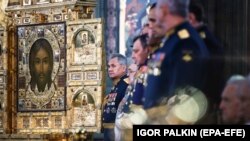By July 1, Russians will decide whether or not 206 amendments that could transform the role of the president and the status of citizens’ rights should become part of their constitution. Although all of these changes already have been approved by President Vladimir Putin and the legislature, President Putin has stated that they will become law only with Russian voters’ approval.
To accommodate the need for social distancing during the coronavirus pandemic, voting will begin on June 25. Two regions – Moscow and Nizhny Novgorod – have the option to vote online.
Until voting ends on July 1, Current Time will take a look each day at the most substantial proposed changes.
The Daily Amendment: Belief In God
What’s Changing:
It can be seen in the cross that sometimes adorns President Putin’s bare chest: Orthodox Christianity is part of Russia’s state heritage and history. As an appeal to his conservative base, critics say, the Russian leader now wants to enshrine that relationship into law.
Russian Orthodox Church Patriarch Kirill, however, rather than President Putin, is the national figure who proposed that the revised constitution refer to God. The words, he underlined, would apply also to Muslims and “many, many others.”
“If there can be ‘God preserve our native land’ in the national anthem, why can’t something be said about this in our constitution?” the church leader asked in February, RIA Novosti news agency reported.
Given Orthodox Christianity’s 1,032-year-long history in Russia, that might not seem an unexpected question for the head of Russia’s largest Christian denomination, an institution that backs the Kremlin’s promotion of “traditional values.”
Alongside the mention of God, the revised constitution would also define marriage as the union between a man and a woman and will identify children as “the most important priority of Russian state policy.”
But rather than these points, the text for the proposed amendment related to God broadly links faith to two other policy themes – preserving Russia’s history and territorial unity.
Under Chapter 3 on Russia’s Federal Structure, Article 67.2 would read:
“The Russian Federation, united by a thousand-year history, preserving the memory of its ancestors, who gave us ideals and faith in God, as well as continuity in the development of the Russian state, recognizes the historical unity of the state.”
Like the tsarist motto Faith, Tsar, and Fatherland, this text comes as part of a trinity.
The first point under Article 67 defines Russia as the heir and legal successor of the Soviet Union – a view taken by the international community, but, also, one in line with President Putin’s nostalgia for Russia’s Soviet past. Veneration of the Soviet past has increased in recent years, while memorials to Soviet repression have come tumbling down.
The third point “honors the memory of defenders of the Fatherland” and bans any “diminution of the significance of the feats” of these individuals.
That, too, could resonate easily with many Russians:
On June 24, the day before the start of voting on the constitutional amendments, concerns about the coronavirus pandemic did not prevent soldiers and officials alike from a delayed celebration of the 75th anniversary of the end of World War II in Europe.
What Was Said Earlier About God In Russia’s Constitution?
The answer is simple: nothing. There is no mention of God in the current 1993 constitution, also known as the Basic Law, although the current constitution does put a barrier between religion and the state apparatus.
Article 14 defines the Russian Federation as a secular state and one in which all religious institutions are “equal under the law” and “separate from the state.”
These provisions will not change if the proposed revisions to the constitution are approved by July 1.
What This Amendment Will Mean For Voters:
Some experts interviewed by Current Time consider that this new article of the constitution, like the article indexing pensions, is meant primarily to attract voters to the polls.
Sixty-eight percent of the respondents in the January 2020 Levada poll identified themselves as Orthodox Christians – more than a twofold increase since 1990, at the end of the Soviet era.
“This adjustment fits very well into the conservative-right turn of things that we’ve observed in Russian politics since 2012 [when Putin was elected for a third term], and it logically continues the entire series of ideas: for example, those connected with the law on defense of believers’ feelings and so on,” commented religious scholar Konstantin Mikhailov.
The recent opening of the Russian armed forces’ cathedral – though mosaics of Putin, Defense Minister Sergei Shoigu, and Soviet leader Josef Stalin were removed – speaks to this trend of mixing religious symbols and “state ideology,” he continued.
Mikhailov wonders what this will mean for religion becoming an obligatory course in public schools.
Although the proposed amendment’s text does not specify any religious faith, he fears that Russians who do not believe in a monotheistic God – the country’s atheists and Buddhists, among them – have been “thrown overboard.”
“With this amendment, they’re turned into, let’s say, second-class people,” he argued.
Not all agree. Russian Human Rights Commissioner Tatyana Moskalkova maintains that the text in no way discriminates against religious minorities. In March, Russia’s Interfaith Council, an official body of Orthodox Christian, Muslim, Jewish, and Buddhist leaders, endorsed the amendment, saying that it will “consolidate the value of the religious beliefs of our country’s peoples.”
For his part, Russian Orthodox Church spokesman Vladimir Legoida has stressed that the amendment does not contradict Russia’s status as a secular state. It simply emphasizes the country’s “historical heritage,” he told reporters in March.
Next Up: What Does 'Rule of Russian Law' Mean For Respect Of International Law?




